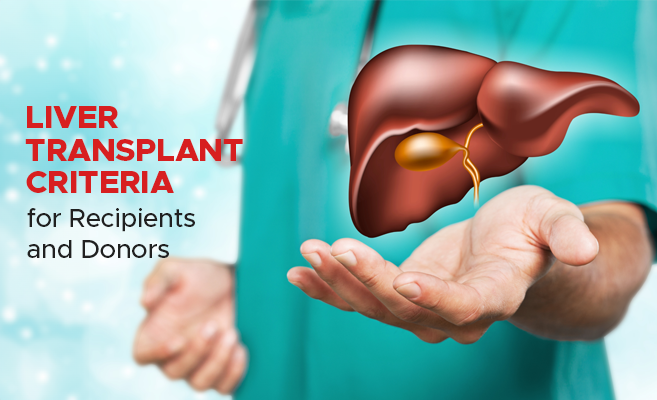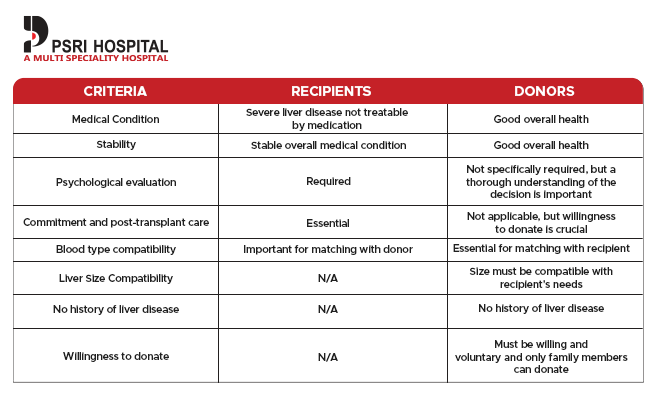Liver Transplant Criteria for Recipients and Donors

A liver transplant is a life-saving procedure for people facing severe liver diseases. It involves replacing a damaged liver with a healthy one from a donor. However, not everyone can undergo this procedure, and there are specific criteria for both recipients and donors. In this blog, we’ll break down the key points to help you understand the requirements for a liver transplant for both recipients and donors.
Liver Transplant Criteria for Recipients
Severe Liver Disease:
To be eligible for a liver transplant, a patient must have a severe liver disease that is not improving with medicine or other treatments. This could include conditions like cirrhosis, liver failure, or particular genetic liver disorders.
Medical Stability:
Recipients should be in a stable medical condition overall. This means they should not have other health issues that could hamper the success of the transplant or pose additional risks during the procedure.
Psychological Evaluation:
A psychological evaluation is often part of the process. This helps ensure that recipients are mentally prepared for the challenges of the transplant and the post-surgery recovery period.
Commitment to Post-Transplant Care:
Successful transplantation requires a commitment to follow a strict post-transplant care plan. Recipients must be ready and able to take medications, attend follow-up appointments, and make necessary lifestyle changes to support the new liver.
Liver Transplant Criteria for Donors
Good Overall Health:
Donors need to be in good overall health. This means they should not have any chronic medical conditions that could threaten their well-being or the success of the transplant.
Matching Blood Type:
Blood type compatibility between the donor and recipient is crucial for a successful transplant. A complete blood test is done at a liver transplant hospital in India to ensure compatibility and reduce the risk of complications.
Liver Size and Compatibility:
The size of the donor’s liver should be compatible with the recipient’s needs. Medical imaging and tests help determine if the size match is suitable for a successful transplant.
No History of Liver Disease:
Donors should not have a history of any kind of liver disease. A healthy liver is essential for the donor’s well-being after the partial liver donation.
Willingness to Donate:
Most importantly, donors must willingly and voluntarily choose to donate a portion of their liver. The decision to become a donor should be made without any external pressure, and donors should fully understand the potential risks and benefits.

Conclusion
Liver transplant surgery is a complex but life-saving procedure that offers hope to individuals with severe liver diseases. The liver transplant criteria for donors and recipients aim to maximise the chances of a successful transplant while ensuring the safety and well-being of everyone involved.
If you or someone you know is considering a liver transplant, it’s crucial to work closely with the doctors who can provide personalised guidance based on specific circumstances. So are you looking for the best liver transplant hospital in India? We have a specialised team of doctors who can guide you and treat you with utmost care and professionalism. visit PSRI Hospital.
FAQs
Q: Who is eligible for a liver transplant as a recipient?
A: Individuals eligible for a liver transplant typically have severe liver diseases like cirrhosis or liver failure that cannot be effectively treated with medications or other therapies.
Q: What does it mean for a recipient to be in “medical stability”?
A: Medical stability for recipients means they should not have other health issues that could interfere with the success of the transplant or pose additional risks during the procedure.
Q: Why is a psychological evaluation required for liver transplant recipients?
A: A psychological evaluation is conducted to ensure that recipients are mentally prepared for the challenges of the transplant and the post-surgery recovery period.
Q: Can anyone become a liver donor, or are there specific criteria?
A: Not everyone can be a liver donor. Donors need to be in good overall health, have a blood type matching that of the recipient, have a compatible liver size, and must not have a history of liver disease.
Willingness to donate is also crucial.
Q: Is blood type compatibility the only factor considered for liver transplant donors and recipients?
A: While blood type compatibility is crucial, other factors, such as the overall health of the donor, the size compatibility of the liver, and the medical stability of the recipient, are also important in ensuring a successful liver transplant. The decision involves a comprehensive assessment of multiple criteria.

 Book An Appointment
Book An Appointment Virtual Consultation
Virtual Consultation





